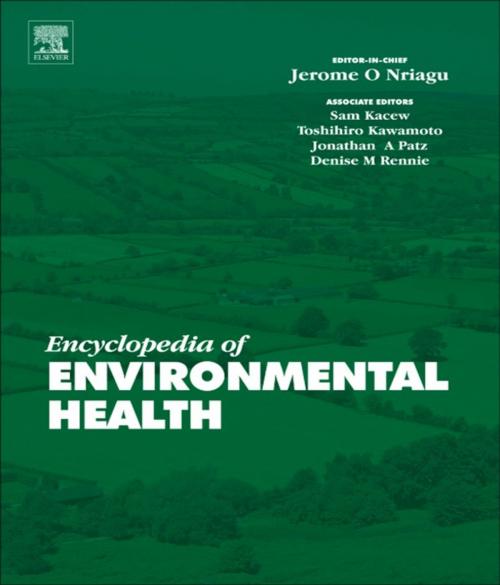Encyclopedia of Environmental Health
Nonfiction, Science & Nature, Science, Biological Sciences, Environmental Science, Biology| Author: | Jerome O. Nriagu | ISBN: | 9780444522726 |
| Publisher: | Elsevier Science | Publication: | September 1, 2008 |
| Imprint: | Elsevier Science | Language: | English |
| Author: | Jerome O. Nriagu |
| ISBN: | 9780444522726 |
| Publisher: | Elsevier Science |
| Publication: | September 1, 2008 |
| Imprint: | Elsevier Science |
| Language: | English |
Environmental health has evolved over time into a complex, multidisciplinary field. Many of the key determinants and solutions to environmental health problems lie outside the direct realm of health and are strongly dependent on environmental changes, water and sanitation, industrial development, education, employment, trade, tourism, agriculture, urbanization, energy, housing and national security. Environmental risks, vulnerability and variability manifest themselves in different ways and at different time scales. While there are shared global and transnational problems, each community, country or region faces its own unique environmental health problems, the solution of which depends on circumstances surrounding the resources, customs, institutions, values and environmental vulnerability. This work contains critical reviews and assessments of environmental health practices and research that have worked in places and thus can guide programs and economic development in other countries or regions.
The Encyclopedia of Environmental Health seeks to conceptualize the subject more clearly, to describe the best available scientific methods that can be used in characterizing and managing environmental health risks, to extend the field of environmental health through new theoretical perspectives and heightened appreciation of social, economic and political contexts, and to encourage a richer analysis in the field through examples of diverse experiences in dealing with the health-environment interface.
- The Encyclopedia of Environmental Health contains numerous examples of policy options and environmental health practices that have worked and thus can guide programs in other countries or regions
- It includes a wide range of tools and strategies that can assist communities and countries in assessing environmental health conditions, monitoring progress of intervention implementation and evaluating outcomes
- Provides a comprehensive overview of existing knowledge in this emerging field
- Articles contain summaries and assessments of environmental health practices and research, providing a framework for further research
- Places environmental health in the broader context of environmental change and related ecological, political, economic, social, and cultural issues
Environmental health has evolved over time into a complex, multidisciplinary field. Many of the key determinants and solutions to environmental health problems lie outside the direct realm of health and are strongly dependent on environmental changes, water and sanitation, industrial development, education, employment, trade, tourism, agriculture, urbanization, energy, housing and national security. Environmental risks, vulnerability and variability manifest themselves in different ways and at different time scales. While there are shared global and transnational problems, each community, country or region faces its own unique environmental health problems, the solution of which depends on circumstances surrounding the resources, customs, institutions, values and environmental vulnerability. This work contains critical reviews and assessments of environmental health practices and research that have worked in places and thus can guide programs and economic development in other countries or regions.
The Encyclopedia of Environmental Health seeks to conceptualize the subject more clearly, to describe the best available scientific methods that can be used in characterizing and managing environmental health risks, to extend the field of environmental health through new theoretical perspectives and heightened appreciation of social, economic and political contexts, and to encourage a richer analysis in the field through examples of diverse experiences in dealing with the health-environment interface.
- The Encyclopedia of Environmental Health contains numerous examples of policy options and environmental health practices that have worked and thus can guide programs in other countries or regions
- It includes a wide range of tools and strategies that can assist communities and countries in assessing environmental health conditions, monitoring progress of intervention implementation and evaluating outcomes
- Provides a comprehensive overview of existing knowledge in this emerging field
- Articles contain summaries and assessments of environmental health practices and research, providing a framework for further research
- Places environmental health in the broader context of environmental change and related ecological, political, economic, social, and cultural issues















